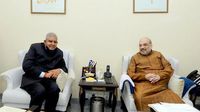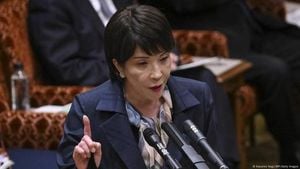In the charged atmosphere of Indian politics, few events pass without sparking controversy, and the sudden resignation of Vice President Jagdeep Dhankhar has proven no exception. On August 25, 2025, Union Home Minister Amit Shah stepped forward to address growing speculation over Dhankhar’s departure, seeking to quell the swirl of rumors that has enveloped the capital since the announcement.
Speaking to the press in New Delhi, Shah urged restraint and perspective, stating, "Dhankhar ji was sitting on a constitutional post and during his tenure, he did good work according to the constitution. He has resigned due to his personal health problem. One should not try to stretch it too much and find something," according to ANI. Shah’s comments came just days ahead of the Vice Presidential elections, scheduled for September 9, and were clearly intended to steady the ship amid choppy political waters.
The Vice President's resignation, announced late in the evening on July 21 through the official handle, caught many off guard. Dhankhar cited medical advice and the need to prioritize his health as the reasons for his decision. Yet, it was not just the resignation itself that raised eyebrows but also the government’s muted response. Prime Minister Narendra Modi, usually swift in addressing such high-profile developments, waited more than 15 hours before issuing a formal statement. This delay, as reported by ANI, only added fuel to the fire of speculation about the true circumstances behind Dhankhar’s exit.
As the dust settled, attention quickly turned to the upcoming Vice Presidential elections. The National Democratic Alliance (NDA) has nominated Maharashtra Governor CP Radhakrishnan as its candidate, while the Opposition has put forward former Supreme Court judge B Sudershan Reddy. The contest promises to be closely watched, with both camps keen to frame the narrative in their favor.
But the intrigue didn’t stop with the resignation itself. According to sources cited by ANI, Dhankhar had allegedly encouraged opposition leaders to push a motion in the Rajya Sabha for the impeachment of Justice Yashwant Varma, a figure linked to the so-called cash-at-home row. However, the government reportedly preferred any such move to originate in the Lok Sabha, the lower house of Parliament. This behind-the-scenes maneuvering, though not confirmed officially, has been the subject of much discussion among political observers and within party ranks.
Rahul Gandhi, Congress leader and frequent critic of the ruling party, was quick to question the circumstances of Dhankhar’s departure. At a recent rally, Gandhi remarked, "Suddenly, the person who used to burst forth in the Rajya Sabha has gone silent, completely silent. So this is the time we’re living in." His comments reflect a broader skepticism within opposition circles, who see the resignation as symptomatic of deeper issues within the current political climate.
The context for all this is a broader pattern of political controversy and rhetorical sparring that has defined the last several months in Indian politics. Allegations of election irregularities, accusations of voter list manipulation, and heated exchanges between leaders of the BJP, Congress, and regional parties have become almost routine. From the BJP’s sharp rebuke of Rahul Gandhi’s claims of "atom bomb" voter list fraud against the Election Commission to the RSS defending Prime Minister Modi’s praise during his Independence Day speech, the political temperature has remained high.
In fact, the Election Commission itself has become a lightning rod for criticism and suspicion. Rahul Gandhi has repeatedly targeted the Commission, accusing it of bias and complicity in alleged "vote theft." His assertions have been backed by senior Congress leaders like Shashi Tharoor and Priyanka Gandhi, both of whom have called for urgent action by the EC to restore faith in the electoral process. The BJP, for its part, has dismissed these allegations as "baseless" and an "embarrassing attack on democracy."
These disputes are not limited to the national stage. In Maharashtra, for example, the Congress and BJP have traded barbs over claims of match-fixing in state polls, with the Election Commission rebuking Rahul Gandhi’s charges as "absurd." Meanwhile, in Bihar, Gandhi has accused the Election Commission of effectively joining the BJP, telling supporters, "You’ve taken BJP membership." The war of words has extended even to the choice of metaphors, with leaders from the RJD and JDU exchanging colorful jibes such as "National Daamad Aayog" and "Rakshas Raj."
Amid this backdrop, Shah’s insistence that the Vice President selection is based on regional balance and not influenced by Tamil Nadu elections is an attempt to project an image of stability and procedural propriety. As he stated on August 25, the selection process aims to ensure regional representation rather than being swayed by the shifting sands of electoral politics. Yet, for many in the Opposition, such assurances ring hollow in the face of what they see as a pattern of political maneuvering and institutional capture.
The upcoming Vice Presidential election, then, is about more than just filling a constitutional vacancy. It is a litmus test for the health of India’s democracy at a time when trust in institutions is being sorely tested. The NDA’s nomination of CP Radhakrishnan, a seasoned politician with a track record in Maharashtra, is seen as a move to consolidate the alliance’s base in the west and south. The Opposition’s choice of B Sudershan Reddy, a former Supreme Court judge, is meant to signal a commitment to impartiality and the rule of law.
For observers, the stakes are high. The Vice President is not only the second-highest constitutional office in the land but also the chair of the Rajya Sabha, the upper house of Parliament. In a climate where every procedural decision is scrutinized for partisan advantage, the outcome of this contest will have ramifications far beyond the corridors of power in New Delhi.
As the September 9 election approaches, all eyes will be on the candidates, the parties, and the Election Commission itself. Will the process restore some measure of trust in Indian democracy, or will it deepen the divides that have come to define the nation’s political discourse? For now, the only certainty is that the drama is far from over, and the coming weeks will be watched with keen interest across the country.
In the end, the story of Jagdeep Dhankhar’s resignation and the race to replace him is a microcosm of the larger struggles facing India’s democracy—where every move is contested, every motive questioned, and the stakes, as ever, remain sky-high.




